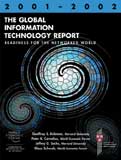The Global
Information Technology Report 2001-2002: Readiness for the Networked World,
Geoffrey Kirkman et. al. (Eds).

Amidst the political and economic
turbulence that has coincided with the bursting of the dot-com bubble,
the first Global Information Technology Report provides a fresh, timely
reminder of why information and communication technologies (ICTs) remain
a powerful and important force for positive change in the world. The Report
helps to fulfill the need for an authoritative, international assessment
of the challenges and realities of the Networked World in which we all
live.
The Global Information Technology
Report 2001-2002: Readiness for the Networked World provides the most
comprehensive documentation to date of how ICTs are being used around
the world. Blending visionary commentary with rigorous analysis, the Report
addresses the major opportunities and obstacles that global leaders face
as they try to more fully participate in the Networked World. Decision-makers
face complex choices for which they need comprehensive and reputable information
and perspective-these challenges range from telecommunications reform
to changing educational needs to new business models to a better understanding
of the impact of ICTs. The Report is an important resource that will help
leaders around the world deal with these and related issues. Through the
development of the first Networked Readiness Index, which ranks 75 countries
according to their capacity to take advantage of ICT networks, a series
of 75 in-depth Networked Readiness country profiles, and thematic chapters
by some of the world's leading experts on the Networked World, the Report
provides an ambitious, global panorama of how ICTs are being used, and
what opportunities and challenges remain. The vision, analysis and action
within the Global Information Technology Readiness Report 2001-2002 make
it a unique and valuable publication for policymakers, business leaders
and others who make important decisions relating to the Networked World.
The GITR
was produced under the leadership of the report's Managing Editor, Geoffrey
Kirkman of the Information
Technologies Group at CID, along with Jeffrey Sachs, Director of CID,
Klaus Schwab, President of the World
Economic Forum and Peter Cornelius, Director of the Global Competitiveness
Program at the World Economic Forum.
The final printed version of
the GITR 2001-2002 will be available from Oxford
University Press by the end of March 2002 (see
ordering information), but selected introductory chapters can be downloaded
below.
The following sections of the
report are available in PDF format. You will need Adobe Acrobat Reader
to view them. You can obtain
Acrobat Reader here.
Chapter
Summaries
CHAPTER
1: Some Thoughts on How ICTs Could Really
Change the World
John Gage
John Gage of Sun Microsystems shares his inspiring vision of how ICTs
could revolutionize economic development worldwide. Gage challenges readers
to link tomorrows technological change to real projects that can have
a lasting, positive impact.
CHAPTER
2: The Networked Readiness Index: Measuring
the Preparedness of Nations for the Networked World
Geoffrey S. Kirkman, Carlos A. Osorio, and Jeffrey D. Sachs
The authors present the Networked Readiness
Index and the major Networked Readiness findings from 75 countries. In
their more detailed findings, they break new
ground in analytical measurement of the factors that generate Networked
Readiness, and suggest that much conventional wisdom about ICT policymaking
may be fundamentally flawed.
CHAPTER
3: Rethinking Learning in the Digital Age
Mitchel Resnick
Mitchel Resnick of the Massachusetts Institute of Technology (MIT) Media
Lab emphasizes the need for radically different learning systems that
tap into the potential that computers, in particular, offer. Drawing upon
his experiences with the Computer Clubhouse and other projects, Resnick
shows how computer-enhanced learning can create meaningful change in the
lives of children, and points to the importance of the underlying philosophy
of learning as key to instituting reform.
CHAPTER
4: Ten Lessons for ICT and Education in the
Developing World
Robert J. Hawkins
Robert Hawkins from World Links, a program of the World Bank Institute,
discusses his programs experience in connecting schools to the Internet,
training teachers, and grappling with curriculum and education reform
issues in developing countries. Hawkins distills the World Links story
into ten cogent, practical lessons that policymakers and business and
community leaders should bear in mind as they attempt to incorporate the
Internet into the educational process.
CHAPTER 5:
The X Internet: Leveling the Playing Field for Businesses in
Developing Nations
George Colony, Navi Radjou, and Eroica Howard
Colony, Radjou, and Howard of Forrester Research show us how the next
generation of the Internet, one that is executable and extended, will
fundamentally change business practices and the sources of competitive
advantage. The authors stress the importance for companies, particularly
in the developing world, to adapt to the coming technological
realities.
CHAPTER
6: The Importance of Organizational Leadership
for Creating Technology Excellence
Soumitra Dutta
Dutta of INSEAD presents two compelling case studies that show the tremendous
impact that leadership and organizational excellence can have in creating
business success using ICTs in the developing world. Dutta effectively
illustrates that managerial innovation is essential to creating environments
where ICT-enabled business models can thrive.
CHAPTER
7: Information and Communication Technologies,
Markets, and Economic Development
Karen Eggleston, Robert Jensen, and Richard Zeckhauser
Karen Eggleston of Tufts University and Robert Jensen and Richard Zeckhauser
of Harvard University present a compelling analysis of the impact of ICTs
on income in the context of rural villages in China. The construction
of their economic model fills an important gap in our knowledge of how
ICTs affect income, and paves the way for more analytical research in
this area.
CHAPTER
8: Community Internet Access in Rural Areas:
Solving the Economic Sustainability Puzzle
Michael L. Best and Colin M. Maclay
Michael Best of the MIT Media Lab and Colin Maclay of the International
Technologies Group discuss the major challenges to extending the benefits
of ICTs to rural areas. Drawing largely upon their experience in southern
India, Best and Maclay show that market forces and entrepreneurship are
of paramount importance in meeting rural ICT needs effectively, and that
perceptions of rural areas as nonviable markets are flawed.
CHAPTER 9:
Electronic Commerce, Networked Readiness, and Trade Competitiveness
Catherine L. Mann
Catherine Mann of the Institute for International Economics builds upon
existing models of trade and e-commerce analysis to devise new analytical
tools for policymakers as they focus on improving the policy environment
for the development of e-commerce. In particular, Mann shows the importance
in developing countries of aligning e-commerce and trade strategies around
principles of competitive advantage and fit.
CHAPTER 10:
Trade in ICT Products: The Global Framework and Empirical Evidence
Peter K. Cornelius, Friedrich von Kirchbach, Fiona Paua
Cornelius and Paua of the World Economic Forum and von Kirchbach and Sėmine
of the International Trade Centre look at trends in the international
trade of ICT products, with particular attention to improving the adoption
of ICTs in the developing world.
CHAPTER
11: Telecommunications Sector Reform A Prerequisite
for Networked Readiness
Scott Beardsley, Ingo Beyer von Morgenstern, Luis Enriquez, and Carsten
Kipping
The authors examine the evidence of telecommunications
liberalization to date, and through rigorous cross-country comparison
and data analysis, present a solid look at the global experience. Their
analysis provides a firm base for their discussion of the levers of policy
reform in Chapter 12.
CHAPTER 12:
The Elements of Successful Telecommunications Sector Reform
Scott Beardsley, Ingo Beyer von Morgenstern, Luis Enriquez, and Carsten
Kipping
Beardsley, Beyer von Morgenstern, Enriquez, and Kipping of McKinsey &
Co. present the policy reform levers that policymakers have at their disposal.
The authors discuss the sequencing and tradeoffs of implementing telecommunications
liberalization programs.
The printed edition of the
Global Information Technology Readiness Report 2001-2002 is available
from Oxford University Press. To order a copy,
please visit
http://www.oup-usa.org/reports/
|






